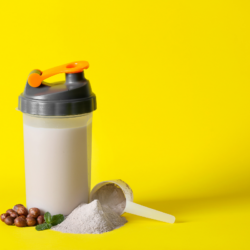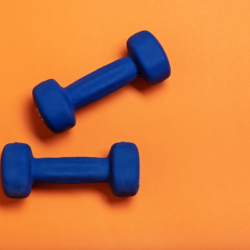Most people who are trying to lose weight would like to have a slimmer, more toned body. Frequently, dietary rebalancing focuses mainly on reducing body fat. The emphasis is on the number on the scales rather than on gaining lean body mass. In fact, body contouring is an approach to weight loss that focuses on the importance of losing fat, but also on gaining muscle at the same time.
As well as losing fat, using body contouring techniques can help you gain strength and increase the number of calories you burn during the day.
What is body composition?
Body composition refers to the amount of adipose tissue and non-fat mass in the body. Its analysis provides a better understanding of general health than, for example, the body mass index (BMI). As a result, body contouring focuses on body composition rather than the figure on the scales.
In fact, it’s a method that combines physical training and nutrition to achieve beneficial changes in the body’s total ‘fat-to-muscle’ ratio. Used for many years in the sporting world, it has only recently gained popularity among people wanting to lose weight while toning up.
How does it differ from a traditional diet?
People use their scales to assess their progress when they start a weight-loss diet. They are therefore satisfied with their diet when the figure on the scale decreases. However, the major drawback of the bathroom scale is that it cannot distinguish between fat mass and muscle mass.
Excess body fat is often associated with a series of health problems that can increase the risk of chronic diseases (cardiovascular disease and diabetes). According to research, a healthy ratio of muscle mass to body fat can improve health and reduce the risk of developing chronic diseases.
Is body contouring a diet?
Body contouring is not strictly speaking a diet in the traditional sense of the term. Unlike a strict diet focused solely on calorie reduction to lose weight, body contouring aims to transform body composition by promoting fat loss while gaining or maintaining muscle mass.
It’s important to note that body contouring relies on a delicate balance between nutrition and exercise. Unlike many restrictive diets, it doesn’t necessarily limit the amount of food you can eat, but rather the quality of the food you choose and how you combine it with appropriate training.
The body recomposition process generally involves increasing protein intake to promote muscle growth, while maintaining a balanced overall calorie intake. It is therefore more of a long-term body transformation strategy than a temporary diet aimed at rapid weight loss.
What are the advantages of choosing ‘body recomp’?
Unlike traditional weight loss methods, body recomposition can result in much slower weight loss . In fact, the figure on the scales may not change at all! This is perfectly normal, as you will lose fat while gaining muscle. Your body will be much more toned and harmonious.
What’s more, the increase in muscle mass will increase your basal metabolic rate. In short, you’ll burn more calories … even when you’re at rest! Let’s end this article by saying that the figure on the scales does not determine your general state of health. It’s better to focus on your body’s total ‘fat-to-muscle’ ratio.
How do you achieve body recomposition?
Now that we’ve understood what body recomposition is and why it can be more effective for weight loss than traditional approaches, it’s time to discuss how to achieve this goal. In this section, we’ll look at the key elements of body contouring, including proper nutrition, resistance training, cardiovascular exercise, adequate sleep and proper stress management. By following these key steps, you can get closer to your body contouring goal and achieve faster, longer-lasting weight loss.
Proper nutrition
Proper nutrition is essential for achieving body contouring. It’s important to consume enough protein to support muscle growth, as well as enough carbohydrates and healthy fats to provide the energy needed for training and muscle recovery.
Resistance training
Resistance training is key to increasing muscle mass and improving body composition. It’s important to vary the exercises and work the different muscle groups for optimum results.
Cardiovascular exercise
Cardiovascular exercise can help burn calories and reduce body fat, but resistance training should not be overlooked in the body contouring process. It’s important to strike a balance between the two to achieve the best results.
Adequate sleep
Sleep is essential for muscle recovery and recuperation. It is important to get enough sleep to allow the body to regenerate and build muscle mass. On average, 7 to 9 hours’ sleep a night is recommended for good health.
Stress management
Stress management is important for overall health and can have an impact on weight loss and body recomposition. Stress can disrupt the metabolism and lead to fat accumulation, so it’s important to find ways to manage stress to optimise results.
What role does nutrition play in the body contouring process?
Nutrition plays a crucial role in the body contouring process. A balanced diet is the cornerstone of this body transformation, as it directly influences your body composition, in particular muscle building and fat loss.
- Proteins: Proteins are essential for body recomposition. They are the building blocks of muscle. Adequate protein intake promotes muscle growth and repair, which is essential for building lean muscle. Sources of protein include lean meat, fish, eggs, low-fat dairy products and vegetables such as beans and peas.
- Carbohydrates: Carbohydrates are your body’s main source of energy, especially during training sessions. They help prevent muscle fatigue and maintain stable energy levels. It is recommended that you choose complex carbohydrates such as wholemeal cereals, vegetables, pulses and fruit rather than simple carbohydrates.
- Fats: Fats are also important in a balanced diet. They play a role in hormone regulation, particularly hormones linked to muscle growth and fat loss. Healthy sources of fat include avocados, nuts, seeds, olive oil and oily fish.
The balance between these macronutrients is essential. There is no single formula that is right for everyone, as needs vary according to age, sex, level of physical activity and body contouring goals. It is advisable to consult a nutrition professional or dietician to draw up a food plan tailored to your specific needs.
What food supplements should I choose for successful body contouring?
Dietary supplements play a significant role in the body contouring process. They can provide valuable support by supplying specific nutrients that promote muscle growth and fat loss. Here’s an overview of popular supplements used in body contouring, along with advice on how to use them safely and effectively:
- Protein powders: Protein powders, such as whey and casein, are commonly used to boost protein intake. They are practical for meeting your daily protein requirements, especially if you find it difficult to obtain them from food sources alone. Consume them after training or between meals to promote muscle growth.
- BCAA (Branched-Chain Amino Acids): BCAAs are a group of essential amino acids (leucine, isoleucine, valine) that promote muscle protein synthesis. They can be taken before, during or after exercise to improve muscle recovery and reduce fatigue.
- Creatine: Creatine is a well-studied supplement that helps to increase strength and performance during bodybuilding exercises. It also promotes water retention in muscle cells, which can give the impression of initial weight gain. Take it regularly for optimum results.
- Omega-3: Omega-3 fatty acids, found in fish oils, are beneficial to general health and can help reduce inflammation, thereby promoting muscle recovery. They are also useful for maintaining a healthy lipid balance.
- Multivitamins and minerals: A good multivitamin supplement can ensure that you receive all the essential vitamins and minerals to maintain your overall health during your body rebuilding period.
- Caffeine: Caffeine is a natural stimulant that can increase energy and mental focus. It can be taken before exercise to improve performance.
To use these supplements safely and effectively:
- Always follow the recommended dosages on the product label.
- Consult a health professional or nutritionist before starting any new supplement, especially if you have underlying health problems.
- Do not use supplements as substitutes for a balanced diet, but rather as supplements.
- Make sure your basic diet is solid before adding supplements.
It is essential to understand that supplements are not a miracle solution and that they must be combined with an appropriate diet and training programme tailored to your body contouring goals.
FAQ
- What is body contouring?
Body contouring is the process of changing body composition by adjusting the amount of muscle mass and fat mass in the body.
- Why can body contouring be more effective for weight loss than traditional approaches?
Body contouring can be more effective for weight loss than traditional approaches because it aims to improve body composition by increasing muscle mass and reducing fat mass, which can lead to faster and longer-lasting weight loss.
- What are the key elements of body contouring?
The key elements of body recomposition include adequate nutrition, resistance training, cardiovascular exercise, sufficient sleep and proper stress management.
- Why is it important to understand the concept of body recomposition?
It is important to understand the concept of body recomposition because it is a different approach to weight loss that aims to improve body composition rather than focusing solely on weight loss. By understanding body contouring, people can take a more effective and sustainable approach to achieving their weight loss and fitness goals.
- Is body contouring a healthy approach to weight loss?
Yes, body contouring can be a healthy approach to weight loss when done correctly with proper nutrition, resistance training, cardiovascular exercise, adequate sleep and proper stress management. It is always important to consult a healthcare professional to ensure that body recomposition is appropriate for each individual.
Source:
- https://pubmed.ncbi.nlm.nih.gov/19623201/
- https://www.ncbi.nlm.nih.gov/pmc/articles/PMC4736063/
- https://pubmed.ncbi.nlm.nih.gov/23890352/







